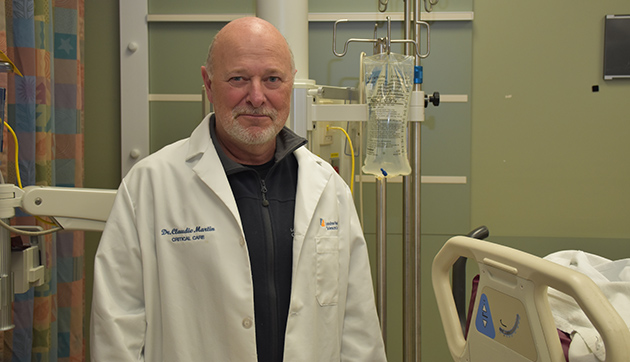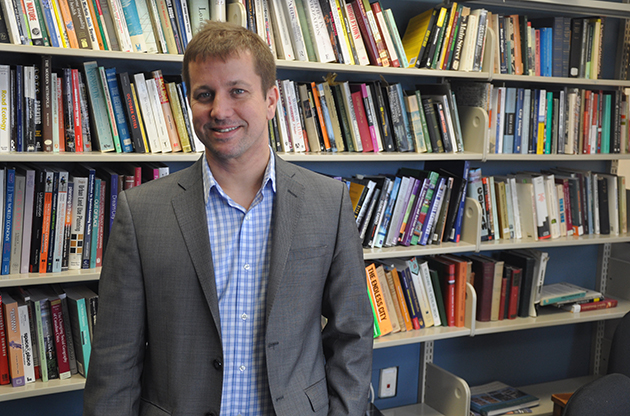

Three studies investigating a range of important COVID-19 questions led by teams from Lawson Health Research Institute and Western University are among an initial 15 projects funded through the Government of Ontario’s COVID-19 Rapid Research Fund.
A team from Lawson will be the first in the world to study a human protein called annexin A5 as a potential therapy for COVID-19 patients with sepsis. The randomized controlled trial will enroll up to 60 critically ill patients from London Health Sciences Centre (LHSC).
“There are no proven therapies to treat COVID-19,” says Dr. Claudio Martin, Associate Scientist at Lawson and Intensive Care Physician at LHSC. “In the most severe cases, it’s complicated by hyperinflammation that can lead to sepsis, acute respiratory distress syndrome (ARDS) and multi-organ failure.”

Above: Dr. Claudio Martin
Sepsis is a life-threatening condition. It occurs when the body’s response to an infection is out of balance, triggering hyperinflammation that can damage multiple organs. Many critically ill COVID-19 patients develop sepsis one to two days before ARDS, suggesting that sepsis is a major contributor to the development of respiratory and multi-organ failure.
Led by Dr. Martin, this clinical trial aims to fight sepsis in COVID-19 patients with a manufactured form of annexin A5 – a human protein that has strong anti-inflammatory properties. Patients will be randomized to receive either the drug at two different doses or a placebo.
“The ultimate goal is to determine whether this drug reduces hyperinflammation associated with sepsis in order to prevent respiratory and multi-organ failure,” explains Dr. Martin, who is also a Professor at Western’s Schulich School of Medicine & Dentistry.
The team also believes the drug will prevent cell death and blood clots associated with COVID-19 through annexin A5’s anti-apoptotic (cell death prevention) and anti-coagulant (blood clot prevention) properties.
This is the first time annexin A5 will be tested as a potential sepsis treatment in humans. The research builds on findings of a preclinical study from Dr. Qingping Feng, Lawson Scientist and Ivey Chair in Molecular Toxicology at Schulich Medicine & Dentistry. His team previously found that annexin A5 can inhibit inflammation and improve organ function and survival when treating sepsis in animal models.
“Annexin A5 is a naturally-occurring protein with great potential as a therapy for sepsis, whether caused by COVID-19 or a different infection,” says Dr. Feng, co-investigator on the project. “If our initial trial is successful, we hope to run a large multi-centre trial to further examine the drug’s potential as a sepsis treatment.”

Above: Dr. Qingping Feng
A team at Western will be using a novel strategy to rapidly develop a blood test for COVID-19 using epitopes – a peptide fragment on the virus that evokes an immune response in humans.
“The antibody test enabled by multiple epitopes is potentially more sensitive and specific than tests that rely on a single viral protein. Serologic testing plays a pivotal role in charting the landscape of the COVID-19 pandemic and guiding return-to-work decisions,” says Dr. Shawn Li, Professor at Schulich Medicine & Dentistry and Scientist at Lawson. “This funding allows us to put together a team of basic researchers and clinician scientists, including Dr. Ian Chin-Yee and his colleagues at the Department of Pathology and Laboratory Medicine, to work on the various aspects of the project with the common goal of developing a serologic test suitable for point-of-care use as quickly as possible.”
To curb the COVID-19 outbreak caused by the SARS-CoV-2 virus, researchers are looking to solve three critical challenges as quickly as possible – detection, treatment and vaccination. Li says the identification of these epitopes are also the necessary first step to devise strategies for the production of virus-neutralizing antibodies to treat those who are severely ill and also to inform epitope-vaccine development for COVID-19.
With the aim of understanding how the pandemic has affected the well-being of businesses and their employees, Dr. Jason Gilliland, Professor in the Faculties of Social Sciences, Health Sciences, and Schulich Medicine & Dentistry at Western, has begun the Food Retail Environment Study for Health & Economic Resiliency (FRESHER) project.
“The project is a rapid response to the widespread closures of, and modified operating conditions for, many retail food outlets,” says Dr. Gilliland, who is also a Scientist at Lawson. “The project outputs are expected to help inform policies and programs that will maintain Ontario’s food security, incentivize economic growth during the recovery period, and improve health and economic resiliency among businesses and employees to future pandemics and emergencies.”
Gilliland and his team will examine the economic and social impacts of COVID-19 in southwestern Ontario by identifying what businesses modified their operations, temporarily closed or permanently closed during the outbreak, and how it has affected businesses and their employees.
“The retail food sector is already facing massive job losses which in turn will have negative economic and health impacts on owners and employees,” he says. “As the project is intended to be a rapid response, we needed to quickly mobilize a large team of research assistants to rapidly collect and continuously update the data. This funding is critical as it allowed us to put together an impressive team of student research assistants, most of whom would otherwise have been out of work due to COVID-19.”
More information on the project and links to the surveys can be found at: fresher.theheal.ca.

Above: Dr. Jason Gilliland